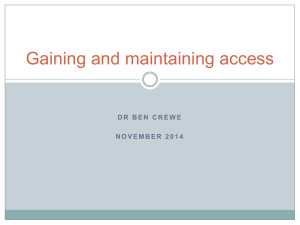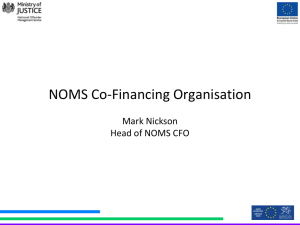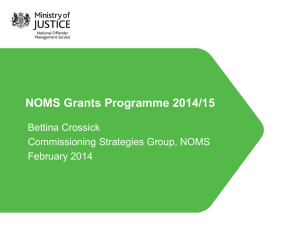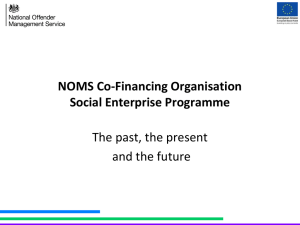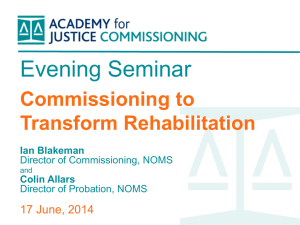Research applications
advertisement
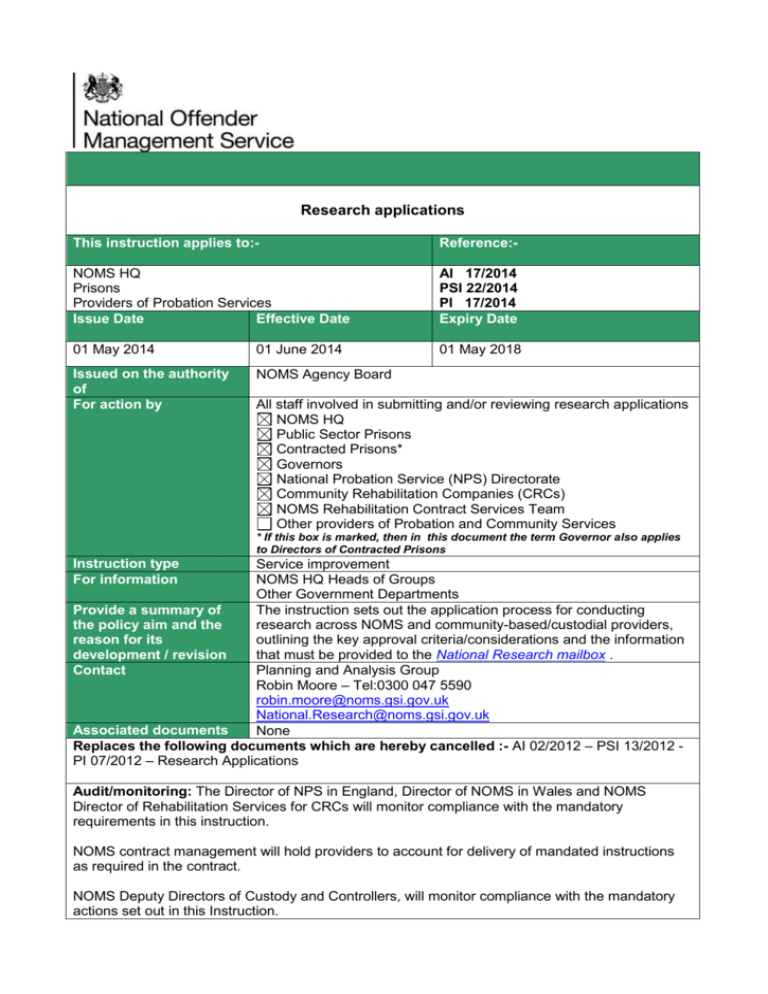
Research applications This instruction applies to:- Reference:- NOMS HQ Prisons Providers of Probation Services Issue Date Effective Date Implementation Date 01 May 2014 01 June 2014 AI 17/2014 PSI 22/2014 PI 17/2014 Expiry Date Issued on the authority of For action by 01 May 2018 NOMS Agency Board All staff involved in submitting and/or reviewing research applications NOMS HQ Public Sector Prisons Contracted Prisons* Governors National Probation Service (NPS) Directorate Community Rehabilitation Companies (CRCs) NOMS Rehabilitation Contract Services Team Other providers of Probation and Community Services * If this box is marked, then in this document the term Governor also applies to Directors of Contracted Prisons Instruction type For information Service improvement NOMS HQ Heads of Groups Other Government Departments Provide a summary of The instruction sets out the application process for conducting the policy aim and the research across NOMS and community-based/custodial providers, reason for its outlining the key approval criteria/considerations and the information development / revision that must be provided to the National Research mailbox . / revision Contact Planning and Analysis Group Robin Moore – Tel:0300 047 5590 robin.moore@noms.gsi.gov.uk National.Research@noms.gsi.gov.uk Associated documents None Replaces the following documents which are hereby cancelled :- AI 02/2012 – PSI 13/2012 PI 07/2012 – Research Applications Audit/monitoring: The Director of NPS in England, Director of NOMS in Wales and NOMS Director of Rehabilitation Services for CRCs will monitor compliance with the mandatory requirements in this instruction. NOMS contract management will hold providers to account for delivery of mandated instructions as required in the contract. NOMS Deputy Directors of Custody and Controllers, will monitor compliance with the mandatory actions set out in this Instruction. Introduces amendments to the following documents: - None Notes: All Mandatory Actions throughout this instruction are in italics and must be strictly adhered to. Page 1 CONTENTS Section 1 Subject Executive Summary 2 3 Application Process Reviewing Applications: Criteria and Common Considerations Ethical Considerations 4 PSI 22/2014 - PI 17/2014 - AI 17/2014 For reference by: All staff in NOMS HQ, all managers in prisons, the NPS and CRCs, and research applicants All staff involved in considering research applications and research applicants ISSUE DATE 01/05/2014 Page 2 1. Executive summary Background 1.1 NOMS is committed to improving efficiency and effectiveness across community-based and custodial services, and at a time of constrained resources it is even more important that funds are spent on activities, processes and interventions that provide the greatest possible economic and social return. This requires that operational policy and delivery is based on reliable and robust evidence, for which high quality research studies and evaluations are essential. Such studies enable delivery to be improved, or can justify reinvestment or resource savings. They also contribute valuable knowledge to the policy evidence base and occupy a crucial role in the policy cycle. 1.2 This instruction applies to all studies and evaluations which apply recognisable research methods to generate quantitative and/or qualitative information (through a range of techniques, e.g. monitoring returns, observations, surveys, interviews, focus groups) in order to address specific research questions. Types of research include, but are not limited to, literature reviews, rapid evidence assessments, systematic reviews, case studies, action research studies, process evaluations, impact evaluations and economic evaluations. 1.3 Systematic reviews follow an explicit protocol for identifying and assessing previous research studies, and for synthesising their findings. Rapid evidence assessments (REAs) are slimmed down versions of systematic reviews, employing the same general principles but in a lighter-touch manner to enable the reviews to be undertaken more quickly. Action research involves collaboration between researchers and those involved in implementing activities, processes and interventions, enabling problems to be diagnosed and solutions developed. The research is thus interactive and iterative. Case studies are in-depth investigations of a limited number of people, events or policies. They tend to be more localised or context specific than process evaluations. Process evaluations assess whether a policy is being implemented as intended and what, in practice, is felt to be working more or less well, and why. Impact evaluations attempt to provide an objective test of what changes have occurred, and the extent to which these changes can be attributed to the policy/type of delivery. Economic evaluations, in simple terms, compare the benefits of the policy/type of delivery with its costs. The processes outlined in this instruction apply to research that has been commissioned and funded both internally and externally. It applies to social research (including health research) and science/technology research across NOMS and community-based/custodial providers across England and Wales. This includes research involving Community Rehabilitation Companies (CRCs) and their subcontractors, Contracted Prisons and Young Offenders’ Institutions (YOIs), but excludes research in Secure Training Centres, Secure Children’s Homes or with Youth Offending Teams – applications to conduct research in these excluded areas should be directed to the relevant establishments/teams and approval sought directly from these services (the Youth Justice Board does not provide approval for external research). Research commissioned by the Ministry of Justice (MoJ) is also excluded – this research will go through separate MoJ quality assurance processes PSI 22/2014 - PI 17/2014 - AI 17/2014 ISSUE DATE 01/05/2014 Page 3 (research@justice.gsi.gov.uk). Depending on the subject area of the research, contact may also need to be made with other Government Departments, e.g. the Home Office. 1.4 The processes outlined in this instruction apply to research projects requiring access to data, staff or offenders. However, they do not apply to the auditing of adherence to standards or the production of management information reports or statistical bulletins. Nor does this instruction apply to requests for routine or one-off data collections which do not form part of a research project. Such requests are regulated and monitored through the NOMS Data Gateway (AI 06/2012; DataGateway@noms.gsi.gov.uk). When such a data collection is part of a research project, the research application will be forwarded to the Data Gateway Manager for consideration as part of the research approval process. 1.5 Many research proposals are processed through the NOMS National Research Committee (NRC). The Committee reviews applications on a monthly basis (with meetings being scheduled mid-month) and consists of full members, analytical consultees and business consultees. To enable the Committee to collate views from the appropriate consultees, applications have to be submitted by the end of the previous month. It is the responsibility of the NRC to: 1.6 Quality assure proposed internal and external research projects, considering whether approval should be given. Advise the NOMS National Research Board on the development and content of NOMS research projects, considering alignment with NOMS strategic research priorities. Advise on the dissemination and use of the results and conclusions of research which impact on NOMS policy and practice. Develop appropriate links between research and the development and management of information. Improve the quality and utility of research produced across NOMS. Establish links between operational, business and research colleagues. The direction for research across NOMS is provided by the National Research Board (which is a sub-committee of the NOMS Executive Management Committee (NEMC)). The Board meets on a quarterly basis and has representation from across the NOMS Directorates, as well as having MoJ and Health representation. It is the responsibility of this Board to: Approve the strategic research priorities for NOMS. Approve the annual research plans for NOMS, creating a co-ordinated programme of work which is fully costed, in line with NOMS business priorities and which provides value for money. Identify gaps in the current and planned research programme to inform future research prioritisation. Ensure alignment between NOMS and MoJ research priorities, plans and protocols. Oversee the work of the NRC. PSI 22/2014 - PI 17/2014 - AI 17/2014 ISSUE DATE 01/05/2014 Page 4 1.7 Promote the evidence-base across NOMS and the development of evidence-based policy/delivery. Monitor NOMS research capacity, capability and performance. Ensure adherence to Government Social Research (GSR) protocols and procedures. The processes set out in this instruction are designed to formalise the research application process for all research relating to NOMS. Specifically to: Standardise the application process, making it less cumbersome to both the researcher and those tasked with reviewing research applications. Improve the scrutiny of research proposals to ensure: (i) The applicant and NOMS attain best value from the research conducted. (ii) The resource implications and impact of the research on operational delivery is considered. (iii) The robustness and relevance of the research is adequately assessed. (iv) Matters of data protection/security and research ethics are dealt with in a consistent manner. Desired outcomes 1.8 The instruction introduces: A new application process that the NRC, lead psychologists and Governing Governors / Directors of Contracted Prisons / NPS Deputy Directors / CRC Chief Executives (or their delegated research leads) are expected to follow and apply. A standard NOMS application form for all proposed research studies, to be used by researchers (internal and external) wishing to conduct research across NOMS and community-based/custodial providers. The NRC, lead psychologists and Governing Governors / Directors of Contracted Prisons / NPS Deputy Directors / CRC Chief Executives (and their delegated research leads) are expected to review this form when dealing with research proposals. Revised guidance, designed to help the NRC, lead psychologists and Governing Governors / Directors of Contracted Prisons / NPS Deputy Directors / CRC Chief Executives (and delegated research leads) when reviewing research applications. Application 1.9 All sections to be read by research applicants and individuals who are responsible for reviewing research applications. Mandatory actions 1.10 Internal and external research applications must be reviewed via the process described in this instruction, and approval must be granted before the research can proceed. All applications must be sent to the National Research mailbox in the first instance. Where an application is then reviewed by lead psychologists or Governing Governors / Directors of Contracted Prisons / NPS Deputy Directors / CRC Chief Executives (or their delegated research leads), information regarding whether it was approved or rejected (including any supplementary information received from the applicant and any amendments set) must be sent to the National Research mailbox. PSI 22/2014 - PI 17/2014 - AI 17/2014 ISSUE DATE 01/05/2014 Page 5 1.11 For each research application, consideration must be given to: (i) the links to NOMS priorities; (ii) the potential demand on resources; (iii) the overlap with other (current/recent) research projects; (iv) the appropriateness/robustness of the proposed methodology; (v) the data protection/security implications; (vi) any relevant ethical dimensions; and (vii) the applicants’ research skills and/or experience. 1.12 Amendments to the scope or nature of an approved research project must not be made without the prior agreement of the approving body (NRC/lead psychologist/establishment/ NPS division/CRC contract package area). Details of approved amendments should be sent to the National Research mailbox. 1.13 A research summary and project review form must be sent to the approving body (copied to the National Research mailbox) at the end of each research project. Resource Impact 1.14 This process is designed to streamline applications, avoid duplication and enable more targeted research across NOMS and community-based/custodial providers. It should not increase the workload for Governing Governors, Directors of Contracted Prisons, NPS Deputy Directors or CRC Chief Executives (or their delegated research leads). (Approved for Publication) Andrew Emmett Director of Finance and Analysis, NOMS PSI 22/2014 - PI 17/2014 - AI 17/2014 ISSUE DATE 01/05/2014 Page 6 2. Application Process 2.1 All applications to conduct research across NOMS and community-based/custodial providers must be made using the standardised NOMS research application form (available on the GOV.UK website and the NOMS intranet) or through the Integrated Research Application System IRAS (https://www.myresearchproject.org.uk/). The latter enables applications to be made to various health and social care bodies; when approval from these bodies is not required, NOMS recommends completion of its own research application form. When submitted to NOMS, the application form must be accompanied by the researchers’ CVs, any ethical submissions and approvals, and any questionnaires, consent forms etc that have already been devised. . 2.2 A process map of a NOMS research application is outlined below. As shown, all proposed projects which fulfil all three of the following criteria should be considered by the individual establishment/NPS division/CRC contract package area: (i) (ii) (iii) restricted to a single establishment, NPS division (one of the six English regions or Wales) or CRC area (one of the 21 contract package areas); not commissioned by NOMS HQ; and not related to extremism. Chartership exemplars by NOMS psychologists in training should be considered by a NOMS lead psychologist. All other projects should be considered by the full NRC, with input from business and analytical consultees. Input from the regional lead psychologist(s) will also be sought by the NRC when the research requires access to prisons in their region(s), and input will be sought from NPS/CRC contacts when the research is community-based. The final NRC decisions will represent a consensus of the views of all consultees. 2.3 Irrespective of the approval route, all applications and decisions must be logged through the National Research mailbox. 2.4 Unless the project is commissioned by MoJ/NOMS and signed off by Ministers, the decision to grant access to prison establishments, NPS divisions or CRC areas (and the offenders and practitioners within these establishments/divisions/areas) ultimately lies with the Governing Governor/Director of the establishment or the Deputy Director/Chief Executive of the NPS division/CRC area concerned. The decision to grant access to existing data lies with the Information Asset Owners (IAOs) for each data source. PSI 22/2014 - PI 17/2014 - AI 17/2014 ISSUE DATE 01/05/2014 Page 7 Research proposal submitted to the National Research mailbox (via standardised form or through IRAS). Researcher CVs, ethical submissions/approvals and any questionnaires/consent forms etc (where devised) should also be submitted. Yes Research commissioned by NOMS HQ or research relating to extremism or research across more than one establishment/NPS division/CRC area? Chartership exemplar by NOMS psychologist in training No Application considered by NRC No, further information required Yes Application considered by relevant NOMS lead psychologist (with the National Research mailbox notified of decision) Approved? No Application considered by individual establishment/NPS division/CRC area, (with the National Research mailbox notified of decision) Research cannot proceed. One resubmission (amended) will be considered. No, rejected Yes Access to establishments / NPS divisions / CRC areas (and the offenders and practitioners within these establishments/divisions/areas) sought from Governing Governors / Directors of Contracted Prisons / NPS Deputy Directors / CRC Chief Executives. Access to existing data sources sought from relevant Information Asset Owners. Research commences. For NOMS HQ projects, the NOMS research plan is updated. Procurement (where necessary) and ongoing quality assurance is the responsibility of project manager. Yes Any amendments required to scope or nature of research? No Seek approval of initial approver (NRC, lead psychologist or establishment/NPS division/CRC area; with the National Research mailbox notified of amendments) Research summary, project review form and planned publications sent to initial approver (copied to the National Research mailbox). For NOMS HQ projects, the NOMS research plan is updated. Peer review and publication clearance processes remain the responsibility of project manager. PSI 22/2014 - PI 17/2014 - AI 17/2014 ISSUE DATE 01/05/2014 Page 8 3. Reviewing Applications: Criteria and Common Considerations Key Principles 3.1 NOMS is committed to developing and implementing policies and practices in line with the best available evidence. Research is encouraged whenever it has the potential to increase the effectiveness of operational policy/delivery (either in the short or longer term), maximising the use of NOMS limited resources. As a consequence of the sheer volume of requests, NOMS must be selective when considering proposals. It is also important that the NOMS duty of care to offenders is taken into account; ensuring individuals are not subject to unnecessary intrusions of their privacy or subjected to potentially damaging research procedures. 3.2 When reviewing applications, consideration will be given to the Government Social Research (GSR) code (http://www.civilservice.gov.uk/networks/gsr/gsr-code) which requires research to be: Rigorous and impartial: The proposed research must be based on sound methodology and established scientific principles. Research must not be undertaken with a view to reaching particular conclusions or prescribing particular courses of action; it must strive to be objective, and any limitations to objectivity should be made transparent. Relevant: The research must be aimed at informing and improving policy formulation, analysis and delivery, clearly allied to strategic priorities. It must represent value for money and must not closely duplicate existing work. Legal and ethical: The proposed research must comply with relevant legislation and maintain the highest ethical standards. 3.3 When research is not approved, reasons will usually be given. However, NOMS reserves the right not to explain the reasons for refusing a research proposal when there are any sensitivity and/or security issues. Consideration will be given to no more than one resubmission. When resubmitting an application, the reasons for the previous rejection must be fully addressed. 3.4 The main grounds for rejecting applications are as follows: 3.5 Insufficient links to NOMS business priorities. The potential demand on NOMS resources. Overlap with other (current/recent) research. The appropriateness/robustness of the proposed methodology. Data protection/security issues. Ethical considerations. Applicants’ limited research skills and/or experience. Unless the project is commissioned by MoJ/NOMS and signed off by Ministers, the decision to grant access to prison establishments, NPS divisions or CRC contract package areas (and the offenders and practitioners within these establishments/divisions/areas) ultimately lies with the Governing Governor/Director of the establishment or the Deputy Director/Chief PSI 22/2014 - PI 17/2014 - AI 17/2014 ISSUE DATE 01/05/2014 Page 9 Executive of the NPS division/CRC contract package area concerned. Typically, an individual will be nominated to act as the main point of contact for research applicants. 3.6 The decision to grant access to existing data lies with the Information Asset Owners (IAOs) for each data source – they are responsible for the creation, use, storage and sharing of the Information Assets for which they have been identified as the owner. IAOs ensure that information is only accessed by organisations and individuals who have a business need to access it; the key considerations are legality, security, proportionality and justification. Where there is a business need for a third party to have access to personal data, the IAOs must ensure that an Information Sharing Agreement (ISA) is in place (AI 11/2013 and PSI 27/2013 Data Sharing Policy), consistent with relevant legal obligations including the Data Protection Act 1998. 3.7 If a reviewer (at an establishment, division or area level) is concerned about any aspect of the research application, clarification of the issues should be sought directly with the researcher. Alternatively, advice is available from the Research and Evaluation Team within the NOMS Planning and Analysis Group (contactable through the National Research mailbox); this includes advice relating to the application process, ethics and data protection/security. 3.8 NOMS reserves the right to halt a research project at any time. Reasons will be given unless there are any overriding sensitivity and/or security issues. 3.9 This instruction applies to internally and externally commissioned research but does not apply to the production of management information reports or statistical bulletins, the auditing of adherence to standards, or requests for routine or one-off quantitative data collections which are not part of a research project – the latter are regulated and monitored through the NOMS Data Gateway. Research prerequisites: 3.10 The aims of any research should not conflict with the NOMS statement of purpose, vision and values. 3.11 Research within NOMS should not compromise the rights, safety and wellbeing of participants. 3.12 Research within NOMS should be of significant benefit to NOMS policy/business, helping to maximise the use of limited resources (as well as enhancing academic knowledge). Researchers must ensure that their research has a clear link to NOMS business priorities or explain how their research could support potential future business priorities (see http://www.justice.gov.uk/publications/corporate-reports/noms for NOMS business priorities; see also ‘NOMS Commissioning Intentions from 2014’ and the accompanying ‘NOMS Evidence and Segmentation’ document – http://www.justice.gov.uk/about/noms/commissioning). Research which focuses on outcomes through quantitative evidence of impacts is encouraged. Taking into account the costs of delivering these outcomes is equally important, enabling NOMS to maximise value for money. 3.13 The demands on staff and resources must be manageable, and proportionate to the profile of the subject area and the potential benefits from the research. 3.14 The project must be of sufficient quality (in terms of methodological rigour). Further guidance on good evaluation can be found within the Magenta Book and accompanying HM Treasury guides: http://www.hm-treasury.gov.uk/magentabook. PSI 22/2014 - PI 17/2014 - AI 17/2014 ISSUE DATE 01/05/2014 Page 10 3.15 The project must avoid duplicating or conflicting with other current research studies. Research proposals should clearly indicate what previous research has been carried out in the proposed area. Research does sometimes require replicating, either on different populations or in different circumstances. However, problems can arise if an application addresses an area on which there is already a national project, with a different perspective. The National Research mailbox can be contacted to determine what previous research has been approved and/or completed in a specific area. 3.16 Data protection and security issues must have been considered and addressed. Researchers must make clear how data will be held securely, how data will be processed and managed, how it will be ensured that individuals cannot be identified and how and when data will be destroyed. 3.17 Ethical issues must have been reviewed and approved. Researchers must make clear the ethical guidelines under which they will be operating. The NRC will consider ethical issues but it is not specifically an Ethics Committee. Where there is any sensitivity, the research should be approved by an appropriate Ethics Committee (e.g. university, NHS, or research body), especially if the proposal involves access to vulnerable offenders. In these situations, a statement of approval from the local ethics committee should be included with the research application or provided once secured. 3.18 In summary, a good research proposal should: 3.19 Have a clear link to NOMS business priorities. State clearly what value the results will provide; research should be of significant benefit to NOMS, strengthening its operational policy/delivery evidence base. Present a resume of previous research and explain how the proposed study derives from this. Set out a logical and robust methodology. Take into account all the resource implications. Clearly set out the limitations of the research, and how any methodological or operational risks will be mitigated. Cleary set out how any relevant data protection/security issues and ethical issues will be addressed. Common considerations of those reviewing research proposals include the following: What will the research add to the NOMS policy evidence base? How closely is it linked to NOMS business priorities? How developed is the existing evidence base? What administrative data is already being collated? Is the estimate of the overall resource (time, staff, information) required to assist with the project realistic? Does the resource requirement seem manageable? Is it proportionate to the profile of the subject area and the potential benefits from the research? Is the methodology clearly described, justified and reasonable? Has it been tailored to the type of policy being considered, and the type of research questions it is hoped to answer? Is it clear how the quantitative/qualitative data will be analysed? Are the limitations clearly acknowledged? PSI 22/2014 - PI 17/2014 - AI 17/2014 ISSUE DATE 01/05/2014 Page 11 Does the research need to involve offenders currently in custody and/or subject to community-based supervision? Is it clear how these offenders will be identified, approached and sampled? Have the likely response rates been considered? Will the sample sizes be sufficient for the intended analysis? Is there a plan for mitigating the main methodological and operational risks, and any potential conflicts of interest? If the desired establishment/division/area is unable to provide the exact resources or access that the researcher requires, can an alternative arrangement be made? What equipment does the researcher wish to use? Will this require security clearance? What existing data does the researcher wish to access? Is there a legal basis for the sharing of the data? Will new information sharing agreements be required? Is the research particularly sensitive? Will support of participants be considered if they become distressed? Do specialist services need to be made available? Does the research involve young people under sixteen? Have the researchers taken steps to protect these research participants? Does the research involve vulnerable offenders (e.g. those with learning difficulties, mental disorder or with a psychological or medical condition)? Have the researchers taken steps to protect these research participants? Does the research involve access to the High Security estate? Have the researchers been trained to operate safely in a high security environment? Does the research involve extremist or terrorist offenders? Have the researchers taken into account any associated public protection issues in the community or any associated order and control issues in the prison establishments? Does the research focus upon a heavily researched group of offenders? Does this pose any concerns for the offenders themselves or the likely quality of any fieldwork? Does the application address any potential physical or emotional health issues for the researchers themselves? Are there sound procedures to secure and evidence informed consent? Have the questionnaires/interview questions been provided? If not, should these be requested? Have they been sufficiently tailored for use with the intended recipients? Will they be tested/piloted for use in the first instance? Have the assessment tools/scales been validated for use with the intended recipients? Do they need to be tested/piloted in the first instance? Is the researcher aware of their duty to disclose behaviour that is against NOMS rules and illegal acts and has this been made clear to potential participants? Will the confidentiality and anonymity of research participants be otherwise assured? PSI 22/2014 - PI 17/2014 - AI 17/2014 ISSUE DATE 01/05/2014 Page 12 Has the researcher addressed all data protection and security requirements? Is it clear how the research data will be transported, stored, managed, processed and destroyed? How will the research be quality assured? Expectations of approved research/researchers: 3.20 Approved researchers must be security cleared where required, taking into account the nature of the sites being visited, the proposed number of visits and the required level of contact with offenders (AI 05/2014 Vetting Function – Security Vetting). When contacting prison establishments/NPS divisions/CRC contract package areas, researchers should clarify, for each site, the level of clearance required. They are then responsible for making certain this is in place in readiness to complete the research. Establishments and divisions/areas are expected to assist with attaining clearance for researchers. 3.21 Approved researchers must abide by the security arrangements of the establishment/division/area. This can impact upon the equipment that can be used, especially in an establishment. Under the Prison Act (as amended by the Offender Management Act 2007), mobile phones, cameras and sound recording devices are classified as list B items, requiring authorisation from Governing Governors / Directors of Contracted Prisons (or nominated persons) to take them into and use them in prison (PSI 10/2012 Conveyance and Possession of Prohibited Items and Other Related Offences). Authorisation is also required to take any IT equipment into a prison (this is a list C item). 3.22 Researchers should negotiate access to pre-existing data directly with the relevant Information Asset Owners (IAOs). The researchers should abide by the data sharing conditions stipulated by each IAO. 3.23 Approved researchers must undertake interviewing in a professional manner. Researchers should not provide their contact addresses/e-mails to the subjects/participants; any requests to contact the researchers should be routed through the establishment/NPS division/CRC contract package area. 3.24 The researchers must make no amendments to the scope or nature of the research, or the purposes for which the collated data are used, without the prior agreement of the approving body (NRC/lead psychologist/establishment/NPS division/CRC contract package area). Role of participants 3.25 Researchers should have in place a sound procedure for securing informed and valid consent from all research participants. This consent should be provided before the research commences and should cover all the uses to which the pre-existing and collated data may be used, who will have access to it, and for how long the data will be held. If researchers are not intending to secure consent from participants, an explanation will be required. 3.26 In the case of adults who are vulnerable because of social, psychological, mental disorder or medical circumstances or learning difficulties, great care must be taken in obtaining consent. If necessary an appropriate third party should be used. 3.27 In the case of children aged under 16, the consent of the child and a parent/legal guardian should be sought, with the parent/legal guardian being approached first. Researchers should provide information that can be understood by the child and assess whether the child has the capacity to understand the research. Children should be accompanied during interviews. In addition, researchers should have regard to issues of child protection and make provision for the potential disclosure of abuse. Within individual establishments/NPS divisions/CRC contract package areas, advice can be sought from the senior member of PSI 22/2014 - PI 17/2014 - AI 17/2014 ISSUE DATE 01/05/2014 Page 13 staff (e.g. “child protection co-ordinator” or “safeguarding manager”) who has responsibility for child protection and safeguarding matters. 3.28 Participants should be informed that there will be neither advantage nor disadvantage as a result of their decision to participate or not participate in the research. Participants should also be informed that they can refuse to answer individual questions. 3.29 Research participants should be aware of the purpose of the research in which they are involved, and who has funded it. If researchers are not intending to inform participants of the purpose of their research, an explanation will be required. 3.30 Research participants must not be subject to intrusive or unnecessary investigations. Potential avenues of support should be specified for those who are caused any distress or anxiety. 3.31 If audio or video-recording equipment is to be used, participants should be asked for their consent to the use of this equipment. 3.32 It should be made clear to participants what is involved in participating and the time commitments involved. Participants should consent to any follow-up contact and the method of this contact 3.33 The anonymity and confidentiality of research participants and their information must be secured. Participants should be made aware of the procedures that have been put in place for this purpose. 3.34 Researchers are under a duty to disclose certain information obtained during research to NOMS. This can include behaviour that is against Prison Service rules and can be adjudicated against (see rule 51 of the Prison Rules 1999), undisclosed illegal acts (previous and planned), and behaviour that is harmful to the research participant, (e.g. intention to self-harm or commit suicide) or others. Disclosure should be made to the offender’s Offender Manager or their line manager (NPS/CRC) or through the completion of a Security Information Report (prison service). Researchers should make research participants aware of this requirement. 3.35 Where consent has been obtained, provision must be put in place for participants to withdraw from the research and to have their data removed up to a specified date (usually linked to the data analysis); they should be made aware of this right and of the mechanism to be used. It should be made clear that withdrawal from the research will not compromise the participants in any way. 3.36 All written communications designed to inform participants about the research should be written in plain English. Methodology 3.37 Research applications must be methodologically sound with a clear and logical research design tailored to the type of policy and the specific research questions. The limitations of the methodology must be clearly acknowledged. The research questions and/or hypotheses must be explicitly stated. 3.38 Research designs should be fit for purpose and, in particular should seek to minimise demands on custodial/community resources by seeking to reach sound research conclusions with the smallest number of research participants. PSI 22/2014 - PI 17/2014 - AI 17/2014 ISSUE DATE 01/05/2014 Page 14 Legal requirements 3.39 Researchers must comply with the requirements of the Data Protection Act 1998 and any other applicable legislation. Data protection guidance can be found on the Information Commissioner’s Office website: http://ico.org.uk. Access to research 3.40 Researchers must make clear in their application who will have access to the data collected during their research. If during the research they propose to change who has access, they must consult the approving body (NRC/lead psychologist/establishment/NPS division/CRC contract package area). 3.41 Research participants should also be made aware of which organisations will have access to the data collected and for what purposes. Data protection/security 3.42 Researchers must store and handle all personal data securely in line with AI 03/2009 and PSO 9015 Information Assurance and PSO 9010 I.T. Security. When using recording devices, it is recommended that devices with encryption technology are used. Recordings should be wiped once they have been transcribed and anonymised unless there are clear grounds for keeping them any longer. 3.43 Researchers must ensure that the data is coded in a way that maintains the confidentiality and anonymity of research participants. Further guidance can be found in the Anonymisation Code of Practice published by the Information Commissioner’s Office (http://ico.org.uk). 3.44 Researchers must state the length of time that the research data will be stored after the completion of the final report/publication date – personal data should be kept no longer than necessary, e.g. when the research is to be published and the scientific journal requires the original data to be kept for a specified period. Data must then be destroyed securely as soon as is practicable. 3.45 In line with AI 03/2009 and PSO 9015 Information Assurance, any loss or suspected loss of personal or sensitive information, in whatever form, must immediately (within one hour) be brought to the attention of an appropriate Manager. A Senior Civil Servant (e.g. NOMS Head of Group) is then required to inform the NOMS Information Assurance (Operations) Team (0300 047 6590) who will issue a report template for the lead researcher to complete so that it can be recorded on the NOMS Data Incident Reporting System. Dissemination of research . 3.46 The researcher must prepare a research summary for NOMS (approximately three pages; maximum of five pages) which (i) summarises the research aims and approach, (ii) highlights the key findings, and (iii) sets out the implications for NOMS decision-makers. It must be submitted to the initial approver (NRC, lead psychologist or establishment/NPS division/CRC contract package area), copied to the National Research mailbox, alongside the NOMS research project review form (which covers lessons learnt and asks for ratings on key questions). Provision of the research summary and project review form is essential if the research is to be of real benefit to NOMS, while also ensuring that the key findings are consolidated, keeping the evidence-base up-to-date and building a library of valuable information. The report must use language that a lay person would understand. It must be concise, well organised and self-contained. The conclusions must be impartial and adequately supported by the research findings. Further guidance on the format of the report is available on request. PSI 22/2014 - PI 17/2014 - AI 17/2014 ISSUE DATE 01/05/2014 Page 15 3.47 NOMS will disseminate the above report internally as is deemed most appropriate, ensuring that the findings are shared with key business leads across NOMS HQ, prison establishments and the NPS. NOMS also reserves the right to summarise key points in external communications and publications, collaborating with the research applicants. The National Research mailbox should be copied into any follow-up correspondence on the report. 3.48 The researcher must state in their research application how else their research will be used and disseminated. NOMS encourages publication to ensure that findings are accessible and contribute to the evidence base. Research reports should thus be of a publishable standard. Copies of planned publications must be sent to the initial approver, copied to the National Research mailbox, along with the date (when known) and location of publication. Peer review and publication clearance processes remain the responsibility of the project/research manager – approval of a research application should not be seen as an endorsement by NOMS of subsequent published reports. As set out in the Civil Service Management Code, all NOMS staff are required to seek permission before publishing material which relates to its official business. Capacity of researchers 3.49 Researchers should be aware of the skills and competencies needed to conduct the research and analysis that is being proposed. They should have the relevant experience, academic background and standing to undertake the research and analysis, as demonstrated by the CVs which must be attached to the research application. Any potential conflicts of interest should be declared. Where necessary and relevant, professional registrations should be declared for assurance. Inexperienced researchers will need to provide evidence that their supervisor or manager is sufficiently experienced to provide the necessary academic support and appropriate supervision to protect both the integrity of the research and the wellbeing of the researcher. 3.50 With regard to student applications from academic institutions, the lead researcher must be a Doctoral student unless the research is already supported by a NOMS/MoJ business lead. Due to the potential volume of applications from all students, it is impractical for NOMS to assist with other applications. PSI 22/2014 - PI 17/2014 - AI 17/2014 ISSUE DATE 01/05/2014 Page 16 4. Ethical Considerations 4.1 If the research presents ethical issues or problems, researchers should refer their research proposal to the appropriate local research ethics committee (e.g. university, NHS, or research body) for approval. In these situations, a statement of approval from the local ethics committee should be included with the research application or provided once secured. 4.2 All universities, NHS trusts and many professional organisations and funding bodies have ethics committees, which consider research proposals. Such committees are valuable in ensuring that research is conducted in a professional manner, providing a safeguard against the risk of research exposing subjects to damage. They assess research in terms of any ethical issues that might arise considering: 4.3 How subjects/participants will be treated. What they will be told. Aspects of consent and confidentiality. How information will be used. Government Social Researchers within NOMS, and others with responsibility for commissioning/approving research, must be aware of and uphold basic ethical responsibilities: GSR Professional Guidance can be accessed here: http://www.civilservice.gov.uk/wp-content/uploads/2011/09/ethics_guidance_tcm65782.pdf. Every research application to NOMS must therefore be reviewed by the approving body (NRC/lead psychologist/establishment/NPS division/CRC contract package area) to see whether it raises any ethical issues (although this should not be viewed as a substitute for ethics committee approval). Importantly, research should be conducted in a manner that: Ensures valid, informed consent is obtained before individuals participate in research. Takes reasonable steps to identify and remove barriers to participation. Avoids personal and social harm. Minimises any conflicts of interest. Protects the confidentiality of information about research participants and their identities. 4.4 Concerns regarding matters of ethics should be discussed with the research applicant direct. Those reviewing applications must contact the Research and Evaluation Team, within the NOMS Planning and Analysis Group (contactable through the National Research mailbox), if they have queries regarding ethics with a copy of the application and a statement of the query that they have. Where there are clear ethical issues that cannot be easily resolved, the approving body can insist that the research is also submitted to an appropriate local research ethics committee (e.g. University, NHS or research body). 4.5 The following sub-sections provide some illustrations of the ethical issues that can arise in research. It is not intended to be an exhaustive list of the ethical issues that applications can present. Consideration has been given to: PSI 22/2014 - PI 17/2014 - AI 17/2014 ISSUE DATE 01/05/2014 Page 17 The British Society of Criminology Code of Research Ethics. The British Psychological Society Code of Conduct. The British Sociological Association Statement of Ethical Practice. The Social Research Association Ethical Guidelines. Informed consent 4.6 When proposed research involves contributions from research participants, it is essential that that they provide informed consent. The process should be based upon the principles of honesty, transparency and openness. This means that participants should fully understand the nature of the research that is taking place and agree to take part without any coercion. Potential participants should always be given the opportunity to ask any questions. Wherever possible, consent should be obtained in writing. 4.7 Informed consent should usually be provided via a participant information sheet and consent form, which should describe the research that is taking place, the time commitments involved, the pre-existing information that will be used, the information that the research participant will be asked to provide, and how all of this information will be used. The consent form should be easy to read and measures should be taken to ensure that vulnerable participants (including those with literacy problems) understand the content of the form. 4.8 In addition, it must be made clear to research participants that they can refuse to answer individual questions or withdraw from the research and have their data removed up to a specified date (usually linked to the data analysis), and that this will not compromise them in any way. Participation in research 4.9 Taking part in research should not automatically lead to any financial benefits or losses for research participants. In addition, potential participants should not feel that they will incur social benefits or losses due to their participation or non-participation in the research. For example, if a researcher is intending to interview an offender in custody, this may result in a loss of earnings from spending time in an interview when s/he would normally be undertaking work. Such a scenario may also occur in the community. Researchers should address this issue in their research application. 4.10 Offering financial incentives to offenders for participation in research will only be considered in very exceptional circumstances. There will need to be strong evidence that response rates have become problematic in the approved study before seeking approval through the National Research mailbox for payments to be made. If it is agreed to give incentives to offenders to take part in research, vouchers rather than cash should always be used. Right to privacy/ confidentiality 4.11 Research participants can be harmed if their privacy is jeopardised by research. Researchers should always make sure that research participants remain anonymous, unless there are very good reasons, and even in these circumstances express consent would be required from the research participants. Researchers should also make sure that contacting research participants does not compromise their privacy. For example, if a researcher is known to be conducting research about sex offenders who deny their offences, approaching offenders may identify their offence to their fellow offenders. Researchers would therefore have to make sure that their research design prevents research participants’ undisclosed offences being broadcast to other offenders. PSI 22/2014 - PI 17/2014 - AI 17/2014 ISSUE DATE 01/05/2014 Page 18 4.12 There are circumstances when a researcher is under a duty to disclose certain information. When appropriate, researchers must inform research participants that they have a duty to divulge the following such information: Behaviour that is against prison rules and can be adjudicated against (please see rule 51 of the Prison Rules 1999). Undisclosed illegal acts (previous and planned). Behaviour that is harmful to the research participant (e.g. intention to self-harm or commit suicide) or others. Information that raises concerns about terrorist, radicalisation or security issues. Research with vulnerable participants 4.13 When research is undertaken with vulnerable offenders – such as young offenders, offenders with learning difficulties or those who are vulnerable due to psychological, mental disorder or medical circumstances – then researchers must put in place special precautions to ensure that the research participants understand the scope of their research and the role that they are being asked to undertake. It is also essential that consent is given freely. Consent will usually be required from a parent/legal guardian for children aged under 16 to take part in the research. Such children should usually be accompanied during interviews. 4.14 When the research concerns subjects that are potentially disturbing (e.g. abuse, suicide, family history), researchers must ensure that there is suitable support available for research participants, and that the participants are aware of these avenues of support. Research already approved 4.15 If an ethics committee has already approved a piece of research, the statement of approval should be included with the research application. Alternatively, it should be provided once secured. This may alleviate any misgivings that NOMS may hold. Any concerns which remain can be discussed with the Research and Evaluation Team within the NOMS Planning and Analysis Group (contactable through the National Research mailbox). Contacts: Robin Moore Head of Research and Evaluation Team Planning and Analysis Group 0300 047 5590 robin.moore@noms.gsi.gov.uk Aminur Rahman National Research Coordinator Planning and Analysis Group 0300 047 5330 National.Research@noms.gsi.gov.uk PSI 22/2014 - PI 17/2014 - AI 17/2014 ISSUE DATE 01/05/2014
